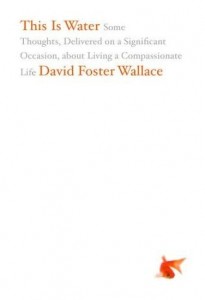By now you’ve probably read David Foster Wallace’s commencement speech, and if you haven’t your life is lesser for it. If you, like, have been meaning to and but can’t find the time, I’ll try to grab the best part to give you a sense of how good it is:
But most days, if you’re aware enough to give yourself a choice, you can choose to look differently at this fat, dead-eyed, over-made-up lady who just screamed at her kid in the checkout line. Maybe she’s not usually like this. Maybe she’s been up three straight nights holding the hand of a husband who is dying of bone cancer. Or maybe this very lady is the low-wage clerk at the motor vehicle department, who just yesterday helped your spouse resolve a horrific, infuriating, red-tape problem through some small act of bureaucratic kindness. Of course, none of this is likely, but it’s also not impossible. It just depends what you what to consider. If you’re automatically sure that you know what reality is, and you are operating on your default setting, then you, like me, probably won’t consider possibilities that aren’t annoying and miserable. But if you really learn how to pay attention, then you will know there are other options. It will actually be within your power to experience a crowded, hot, slow, consumer-hell type situation as not only meaningful, but sacred, on fire with the same force that made the stars: love, fellowship, the mystical oneness of all things deep down.
Not that that mystical stuff is necessarily true. The only thing that’s capital-T True is that you get to decide how you’re gonna try to see it.
This, I submit, is the freedom of a real education, of learning how to be well-adjusted. You get to consciously decide what has meaning and what doesn’t. You get to decide what to worship.
It may not be the best part, but it’s a good one. The whole thing is good. It’s now, have you heard?, available in overpriced hardcover.
 Well $14.99 isn’t terribly overpriced for a hardcover, but it is and seems to remain online for free. Apparently the hardcover prints each sentence on its own page, to make it more booklike. I should be less cynical of this, particularly since I’ve read DFW’s speech. At any rate, the whole point of this entry is the speech’s title, which refers to a little joke DFW tells at the speech’s opening:
Well $14.99 isn’t terribly overpriced for a hardcover, but it is and seems to remain online for free. Apparently the hardcover prints each sentence on its own page, to make it more booklike. I should be less cynical of this, particularly since I’ve read DFW’s speech. At any rate, the whole point of this entry is the speech’s title, which refers to a little joke DFW tells at the speech’s opening:
There are these two young fish swimming along and they happen to meet an older fish swimming the other way, who nods at them and says “Morning, boys. How’s the water?” And the two young fish swim on for a bit, and then eventually one of them looks over at the other and goes “What the hell is water?”
It’s a joke about experience and consciousness, and it turns out it’s taken right out of Infinite Jest. I ran across the passage yesterday, occurring in that erratic Interdependence-Day middle section right after Eschaton, where the E.T.A. kids are watching the Mario’s puppet-show version of Himself’s ONANtiad and the narrator’s informing us of Eric Clipperton’s habit of appearing at top-level tennis tournaments with a gun held to his head throughout play, threatening to kill himself should he lose. And then there’s some Marathe/Steeply stuff, and then lots of A.A. meeting information, namely how Gately’s White Flag Group travels around metro Boston on Commitments to speak with other groups. One time, Gately gets up and talks about how he feels like a phony w/r/t A.A.’s whole Higher Power decree, and it’s afterward that one of the tough biker dudes who compose the hosting Tough Shit But You Still Can’t Drink Group tells Gately it was Good to Hear Him, and then delivers the fish/water joke (via the narrator’s summary dialogue):
This wise old whiskery fish swims up to three young fish and goes: ‘Morning, boys, how’s the water?’ and swims away; and the three young fish watch him swim away and look at each other and go, ‘What the fuck is water?’ and swim away. The young biker leans back and smiles at Gately and gives an affable shrug and blatts away, a halter top’s tits mashed against his back.
Gately’s forehead was wrinkled in emotional pain all the way up Rte. 3 home. (445)
It was Good the See the joke when I ran across it, good to know that good writers steal from themselves without making it look self-defeating. It’s great that DFW didn’t bother to mention his original use of this joke in his speech: “In my second novel, I have a character who’s a recovering oral-narcotics addict, and in one scene,” etc. Though given the immensity of this book (on page 482 of 1079), it would be pretty hard not to steal from it. I’m still stealing from it. I’ll probably always be.